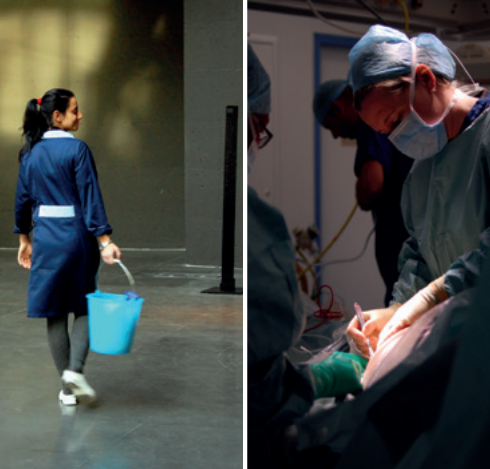
Although employment is on the rebound across Europe, increasing by 1.8 million jobs between mid-2013 and mid-2014, this recovery is not, by and large, based on the creation of full-time, permanent jobs. The traditional, standard employment contract is increasingly being replaced by non-standard or atypical forms of employment – part-time and temporary work, as well as self-employment.
This is one finding from the 2015 annual report of the European Jobs Monitor, which looks at employment developments over 2011–2014. The report also shows that permanent, full-time employment is increasingly the privilege of workers in the best-paid jobs.
When jobs are categorised by how much they pay, full-time, permanent jobs increased only in the highest pay category and declined in all others (see the figure below). Atypical employment, by contrast, increased in four of the five categories, with significant growth in the top and the bottom categories (of around 500,000 jobs in each). This finding suggests that full-time, permanent employees have been replaced by non-standard workers, especially in low-paid but also in mid-paid jobs.

The countries in which non-standard employment has been growing fastest include the four most populous Member States – France, Germany, Italy and the UK – as well as Austria, Cyprus, the Czech Republic and the Netherlands.
Growth in part-time work
Growth has been particularly strong in part-time jobs, with the number increasing by 2.3 million over the three-year period, while full-time employment fell by 1.7 million.
Part-time working has expanded most in the lowest pay category, where the jobs of retail worker, cleaner and helper have shown the greatest growth. But part time also grew more or less evenly across higher-paid categories, which suggests it has become more normal in these jobs too, as has been the case for teaching professionals and health professionals, for example.
The share of part-timers has risen especially sharply in Austria and Germany in recent years, and it has continued to grow in the Netherlands, where in 2014 the number of part-time workers actually overtook the number of full-time workers for the first time.
Part-time employment has also grown in countries where labour market performance has been weaker and the workforce overall has contracted since 2011, such as Cyprus, Greece and Spain. This growth, however, has only partially compensated for the much more substantial decline in full-time employment in the same jobs.
Male part-time rises
An emerging pattern since the recession has been the increase in male part-time workers. Four out of five part-time workers in the EU are women, but the net increase in part-time employment in recent years has been much more evenly distributed by gender. Over one million new part-time male workers were added to the EU workforce between 2011 and 2014.